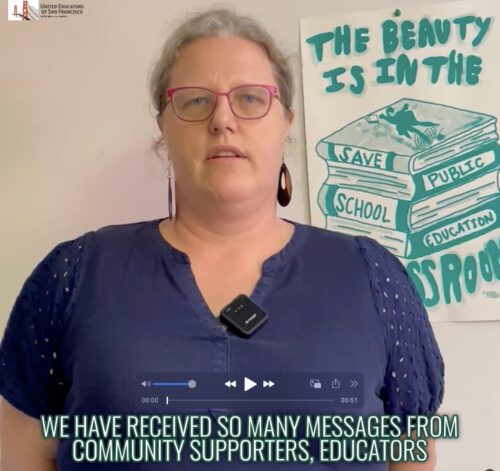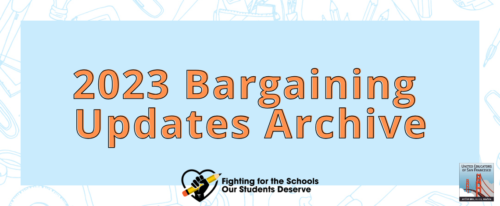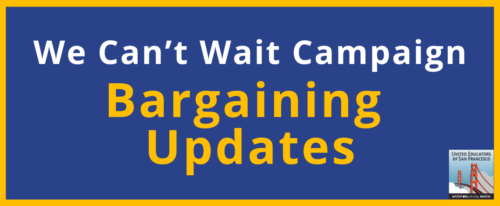
Quick Links
Newsletter Sign Up
Family & Community Landing Page
Adopt a picket
Send a Letter to District Management
Donate to our Solidarity Fund
Please email all media requests to communications@uesf.org
Feb 11 Bargaining Update
Tonight, your big-bargaining team spent over 12 hours negotiating with SFUSD. A hundred of us waited for hours for the District’s promised counter until 1 in the morning, only to be told they had nothing to pass. You can view all proposals from today here.
After a day of unwavering support from our communities this failure was frankly shocking, and absolutely unacceptable to us. We deserve to be back in our classrooms and schools. We miss our students. Over the last three days, our bargaining team has spent more hours in this room waiting for the District to do what’s right than we have with our own families.
We are in a fight for the future of our students, and we know the community is with us. Today, thousands of educators and community members flooded the beaches then turned around and showed up in the rain at the War Memorial in support of our bargaining team.
We are thrilled to have the support from the majority of San Francisco’s Supervisors who joined our rally to support our bargaining team today. They have priorities that match our own: Stable schools for students and stable lives for our educators.
Tonight, after seeing this show of solidarity from our city supervisors and one SFUSD school board member, we call on the rest of the board of education to stand with students and do what’s right to settle this contract. We need the district to prioritize their public dollars to meet our demands:
-
Give our educators Wages that will keep them in this city.
-
Give our educators the security of Fully Funded Family Healthcare.
-
Give our educators in special education the ability to meet the needs of our students
It is up to the Board of Education and Superintendent Su to figure this out.
We waited all night for a counter proposal and we expect a full response tomorrow. All sites should plan to be back on the line tomorrow morning Thursday, Feb 12, 30 minutes before the bell rings. Do not report to the staffing hubs or sign in; walk the picket lines in support of the schools our students deserve. After morning pickets, we gather at 12pm at Embarcadero Plaza for a march to City Hall. One day longer, one day stronger! See you tomorrow.
Feb 10 Bargaining Update
If the last 48 hours have taught us anything, it is that the district has a priorities problem. Our community agrees and has come out in the tens of thousands; they walked the picket line with us, and have coordinated endless support. Our city and members are united, and we know SFUSD has the money to prioritize a fair contract.
Tony Thurmond, the California Superintendent, let us know that he is with us and that the district needs to prioritize students now. SFUSD is the reason for the delay. SFUSD needs to figure this out.
The district continues to show a lack of urgency to reach an agreement that centers on our students and their needs. Tonight, we received a workload proposal that will not meet the needs of our special education students, and a healthcare proposal that still puts our families at a loss.
While we’ve seen movement towards an agreement that will bring our students back to classrooms, and made a few important steps on that path. We know there is more work to be done. Here are all the proposals we passed tonight.
Tonight, at the bargaining table, we made it clear.
What comes next is a matter of the district prioritizing classrooms, students, and educators. Our families are watching and waiting. We will be out on the picket lines tomorrow, and we know you’ll be there, too. After morning pickets, we gather at 12pm at Ocean Beach (1070 Great Highway) to create a giant human banner – thousands will use our bodies to spell a 100 by 300 foot “STRIKE FOR OUR STUDENTS” message on the beach! More details are below.
SFUSD may not know their priorities, but educators always will.
Feb 11 Strike Update
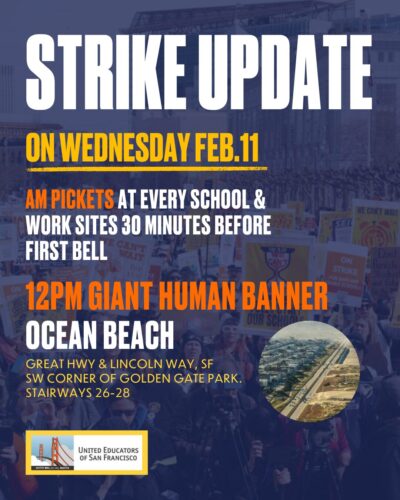
You showed up 20,000 strong today, San Francisco! Overnight, our numbers doubled. This is what solidarity looks like. The power of each and every one of you was felt throughout the entire city, from our morning pickets to rallying at Dolores Park, and then onward to Civic Center, where our voices were heard at the bargaining table!
Our big bargaining team is still at the table negotiating with district management. We are willing to stay here as long as it takes, but we have not received anything to indicate that we will reach an agreement tonight. If anything changes, we will message out any major updates to everyone.
UESF members should attend their Wednesday morning picket lines. All sites should plan to be back on the line again tomorrow morning, 30 minutes before the bell rings. Do not report to the staffing hubs or sign in; walk the picket lines in support of the schools our students deserve. After morning pickets, we gather at 12pm at Ocean Beach (1070 Great Highway) to create a giant human banner – thousands will use our bodies to spell a 100 by 300 foot “STRIKE FOR OUR STUDENTS” message on the beach! More details are below. One day longer, one day stronger! See you tomorrow!
Feb 11 Action
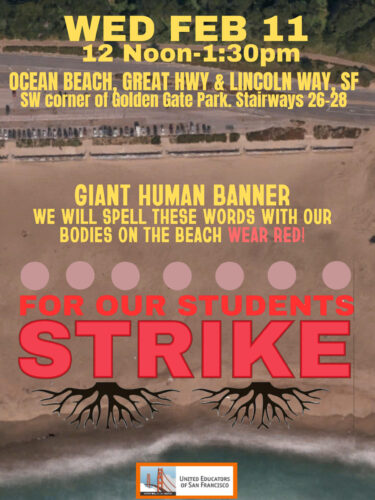
Feb 10 Strike Update
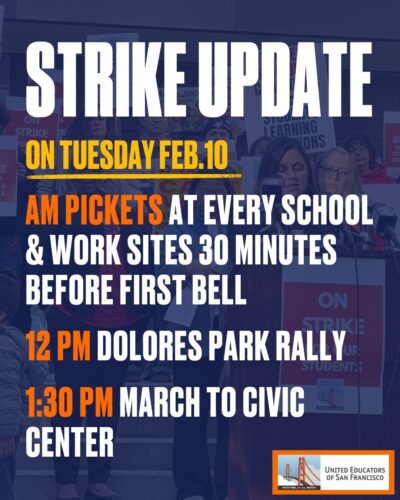
What an incredible day, San Francisco! You really showed up for the schools our students deserve! We started the morning strong, with 120 pickets across the entire city, as educators, students, and families walked the line demanding stable schools now. We followed that up with 10,000 strong at Civic Center Plaza to let the District know we have the numbers and support of this entire city.
Our big bargaining team is still at the table negotiating with district management. We are willing to stay here as long as it takes, but we have not received anything to indicate that we will reach an agreement that provides for fully funded family health benefits, a workload model, and raises. We have made great progress with agreements on important non-cost items. You can view all proposals here. If anything changes, we will message everyone.
All sites should plan to be back on the line tomorrow morning, 30 minutes before the bell rings, and to rally at Dolores Park at noon. Do not report to the staffing hubs or sign in; walk the picket lines with your colleagues and educators to show how strongly we support the fight for the schools our students deserve. When we fight, we win!
Without major news, you can expect a bargaining update tomorrow morning at the picket lines. After your morning pickets, we gather at 12pm at Dolores Park for a rally, and at 1:30 PM we will march to Civic Center. See you tomorrow!
Feb 9 Strike Update
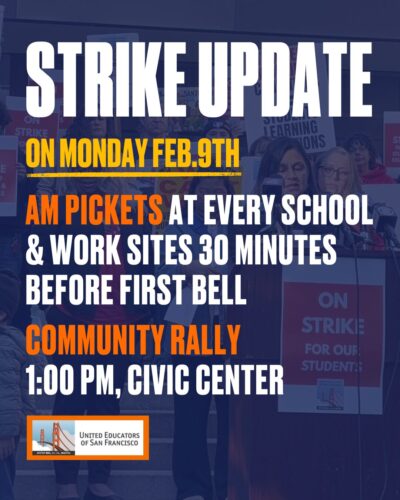
We will walk the picket line Monday February 9 and then rally at Civic Center at 1pm for an agreement that meets the needs of our students and our educators. Last night we spent a lot of time at the table negotiating with SFUSD. We were ready to finally hear from the district that they are ready to come to an agreement that will finally bring stability to our students. But the proposals the district came with to address special education, healthcare, and salary just didn’t go far enough. We did see some movement from the district last night–and are happy that we came to an agreement on Sanctuary Schools. This is an important win for our entire school community. You can view our 1pm press conference from earlier today on Instagram and Facebook.
We have made it very clear that our demands are for fully funded family healthcare for our educators, improvements to special education, and salary increases that do not come at the cost of concessions or takeaways. We cannot accept salary increases that come with cuts to school sites, and we cannot accept special education solutions that only affect a small number of our students. We cannot accept healthcare proposals that come with heavy financial burdens for our members.
We need to see serious movement from the District. Our team is working hard today to respond to the proposals we received last night. If no tentative agreement is reached today, Monday, we hit the picket lines! All our students and families deserve schools that provide safety and stability. When we stand together, we build the power to win. Our solidarity is our strength. Join us on the picket line tomorrow morning and at Civic Center Plaza at 1pm!
2.7 Bargaining Update
We are thrilled to announce that we reached an agreement to protect Sanctuary Schools in our contract! This movement from the district is a direct result of the organizing and pressure our communities have placed on SFUSD. Thank you for all of your support.
UESF educators worked for nearly 12 hours today to reach an agreement. But were disappointed that there’s still little movement on wages, and there’s still no fully paid family healthcare. Despite Dr. Su joining us at the bargaining table, the district is clearly not taking our demands seriously. They are still telling us that any salary increases will come at the cost of previous contract wins. They are still not addressing the widespread crisis in our special education classrooms. And they are still not offering us a contract with fully funded family healthcare. Click here to view all proposals passed tonight. Also, see the comparison chart we made at the bottom of this email.
There is nearly 1 day left until we go on strike for the schools we know our students deserve. Time is running out. The district needs to step up.
San Francisco! We need you in this fight! Check out our we can’t wait page for information and actions. You can donate to our solidarity fund. You can make your voice heard by sending letters and supporting our community. When we fight! We Win!
2.5 Bargaining Update
Tonight –after announcing our historic strike this morning, our big bargaining team met with SFUSD representatives. After multiple public messages, statements, and media announcements from the district that they were prepared to formally offer educators fully funded family healthcare, the proposal passed tonight did not include any such language, nor did it advance movement in other crucial areas, like special education.
We are disappointed to come to yet another bargaining session with little meaningful movement by the district, especially after a fact-finding report made recommendations affirming the district’s ability to do so. Tonight, every proposal they gave us was completely contingent on increasing our class sizes and cutting existing benefits, site funding, pay, and staff. You can view the SFUSD proposal package here. Also, see below the comparison chart we made at the bottom of this email for a full breakdown.
They are clearly not serious about stabilizing our schools. But we are.
UESF educators are STILL waiting for SFUSD to bring a serious proposal to the table. Until then, we remain ready to strike for the schools our students deserve should the district force us to on Monday, Feb 9.
There is still time for the district to figure it out and avoid this crisis of their own making. We invited them back to the table on Saturday to give them more time to address the urgent crises in our schools. We hope they use this time to create a serious, stabilizing offer.
To our entire school community, we invite you to join us! Check our we cant wait page– you can donate to our solidarity fund and make your voice heard by sending a letter to the Board of Education demanding that they join us in prioritizing our students.
2.5 UESF Strike Announcement
Dear Educators, Families, and San Francisco Community,
The growing vacancy and turnover crisis in SFUSD harms students every single day. For almost a year, educators have proposed real solutions for stability — including fully funded family healthcare, a Special Education workload model to improve working and learning conditions, and competitive wages that keep high-quality educators here. District management has not acted with the urgency our students deserve.
Over 5,200 educators overwhelmingly voted yes last week to strike because there had been no urgency to meet our demands and proposals that prioritize stability for our students. Since the strike vote, SFUSD management has begun exploring creative solutions, but so far, no proposals have been made. The 100+ person UESF negotiations team is scheduled to meet on Thursday and is ready to hear from district management. We hope they now feel it is necessary to come to the table with an offer that provides real solutions to stabilize our schools.
While we appreciate the late stage urgency, we are left with no other option but to announce that, without an agreement that meets the needs of our students and educators, United Educators of San Francisco intends to strike on Monday, Feb 9th. You can see the live stream of our press conference from this morning on Instagram and Facebook.
We didn’t come to this decision easily, and we do not take the next steps lightly. We want to be in our classrooms with our students where we belong every single day.
And we know this truth: The status quo is failing our students. If we have to strike, we will strike for the students currently without a permanent educator. If district management chooses not to take responsibility, we will strike so educators can afford to insure their families and housing in our communities. If the Board of Education does not take responsibility, we will strike to stop the exodus of highly qualified educators.
We can’t wait. Because every child deserves safe, stable classrooms and schools.
What our community can expect
-
Morning picket lines will be held at every work site starting Monday, Feb 9th
-
Families are welcome and encouraged to stand with us
-
Daily citywide activities that elevate student, educator, and community voices
How families and the community can support
-
Join our picket lines (click here to adopt a picket)
-
Click here to send a letter to the Board of Education and demand they settle today
-
Donate to the solidarity fund
-
Share your story — why does stability matter to your student? Tag us on social media! IG: unitededucatorsofsf FB: UESF61
We will return to our classrooms the moment the District agrees to the conditions that stabilize our schools and protect the education our students deserve.
In unity and unwavering commitment to the schools our students deserve,
Cassondra Curiel
UESF President
2.4 Media Advisory
Media Advisory: Press Conference Thursday, Feb 5, 2026, at 8:45 AM
Contact: Amanda Hart, ahart@uesf.org, 510-631-4437 & Jessica Beard, jbeard@cta.org, 415-350-3112
San Francisco Educators on Brink of Potential Strike as Impasse Process Ends
United Educators of San Francisco have approved a strike if the district does not resolve high turnover, vacancy crisis destabilizing schools
SAN FRANCISCO — San Francisco Educators remain committed to continuing their fight for improved working and learning conditions as the impasse process has ended today with no agreement that would bring stability to classrooms and schools. The release of a report from a state-appointed neutral states that the district can and should offer educators fully funded family healthcare and raises, affirms the threats to our immigrant and housing insecure communities are real, and acknowledges improvements in special education must be made to bring stability to the district. Over 5,200 educators overwhelmingly voted yes last week to a potential strike if SFUSD leadership cannot come to an agreement that prioritizes stability for their students. UESF will hold a press conference Thursday morning to discuss their next steps. The 100 person+ UESF negotiations team is prepared to negotiate Thursday and Friday evenings.
“The report does not go far enough–and the recommendations here alone will not solve the stability crisis in our district. But, we are happy to see validation of what we already know–that SFUSD can and must stabilize staffing and special education programs for our students,” President Cassondra Curiel said. “Now is the time for the district to come to the table with real solutions and show the community that they are fully committed to funding the classrooms and schools our students and communities deserve.”
The United Educators of San Francisco have been negotiating a contract for almost a year, with the goal of stabilizing classrooms and school sites. Parents and educators point to a crisis of vacancies and years of high turnover destabilizing the district. Educators are demanding fully funded family healthcare, raises and improvements to working and learning conditions that would keep educators in San Francisco. As attacks escalate on immigrants and the cost of living increases, educators are also advocating for the district to commit to important protections for both housing insecure and immigrant students and families.
Teachers are especially focused on improving the learning conditions of their special education students. The most vulnerable students in the district have been subjected to the least stable learning environments as unsustainable working conditions cause educators to leave the district each year. High needs special education classrooms have gone without a permanent teacher for years. The district also has hundreds of vacant paraeducator positions that are crucial to providing legally mandated access to learning for students receiving special education services.
San Francisco educators receive some of the lowest contributions to their healthcare costs among neighboring districts, which leads many of them to seek work elsewhere. Other nearby districts offer fully covered health care. Current educator healthcare contributions have risen to up to $1,500 a month, and up to 40% of the paychecks of some of the lowest earning crucial classroom support staff. This too is a major factor in the vacancy crisis facing the district with hundreds of positions unfilled still this year.
District officials recently allocated $111 million dollars to a rainy day fund, money UESF members say needs to be directed back to classrooms and school sites. The district’s last formal proposal was for a 2% wage increase that included major concessions for educators.
What: United Educators of San Francisco Stable Schools Press Conference
When: Thursday, Feb 5, 2026, at 8:45 AM
Where: 555 Franklin St, San Francisco, CA 94102
Who: San Francisco educators, parents, and community allies
2.3 Bargaining Update
Strike Authorization Vote
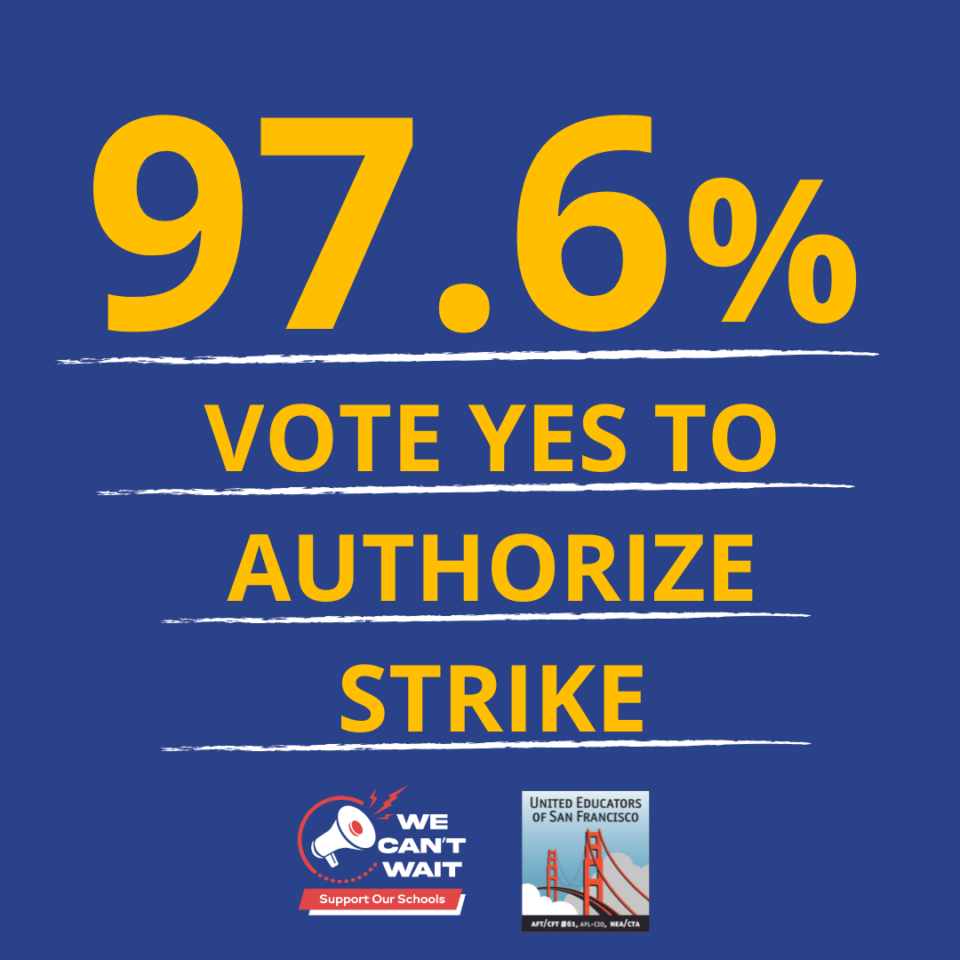
Over 5,200 UESF members voted 97.6% YES to authorize UESF leadership to call for a strike if District Management makes it necessary. Now is the time for the district to act. We remain prepared to hear any real solutions the district may formally bring to the table that will stabilize our district for our students, educators, and families as we await the Feb 4 fact finding report to be released. Below is the press release we sent out over the weekend. Be sure to check out this San Francisco Chronicle article! We will share updates as they become available.
97.6% of Educators in San Francisco Vote Yes to Potential Strike for their Students
SAN FRANCISCO—Over 5,200 educators in San Francisco have overwhelmingly voted yes to a potential strike if SFUSD leadership cannot come to an agreement that prioritizes stability for their students. The announcement comes in the midst of nearly 300 educators coming together to prepare for the potential strike at today’s Strike School. The United Educators of San Francisco have been negotiating a contract for almost a year, with the goal of stabilizing classrooms and school sites. Parents and educators point to a crisis of vacancies and years of high turnover destabilizing the district. Educators are demanding fully funded family healthcare and improvements to working and learning conditions that would keep educators in San Francisco. As attacks escalate on immigrants and the cost of living increases, educators are also advocating for the district to commit to important protections for both housing insecure and immigrant students and families.
Teachers are especially focused on improving the learning conditions of their special education students. The most vulnerable students in the district have been subjected to the least stable learning environments as unsustainable working conditions cause educators to leave the district each year. High needs special education classrooms have gone without a permanent teacher for years. The district also has numerous vacant support positions that are crucial to providing legally mandated access to learning for students receiving special education services.
San Francisco educators receive some of the lowest contributions to their healthcare costs among neighboring districts, which leads many of them to seek work elsewhere. Other nearby districts offer fully covered health care. Current educator healthcare contributions have risen to up to $1,500 a month, and up to 40% of the paychecks of some of the lowest earning crucial classroom support staff. This too is a major factor in the vacancy crisis facing the district with hundreds of positions unfilled still this year.
District officials recently allocated $111 million dollars to a rainy day fund, money UESF members say needs to be directed back to classrooms and school sites. The district’s last formal proposal was for a 2% wage increase that included major concessions for educators.
“The time is now for the district to act,” President Cassondra Curiel said. “Our community is standing with us in our fight for the consistent classroom teachers, special education supports, and stable programs our students and families need and deserve. Instead of siphoning money out of our schools and into savings accounts, or contracting out to traveling psychologists or non-district special education support staff, SFUSD should be prioritizing stability for our students. What comes next is ultimately up to the district and their actions, but San Francisco educators are making it clear that we are more than willing to do everything we can for our community.”
United Educators of San Francisco will now await the non-binding fact-finding recommendations to be issued this week in the final step before any potential strike. Educators remain committed to reaching a fair settlement that provides:
- Fully funded family healthcare and competitive wages for all educators
- Safe and supportive working and learning conditions in special education
- Sanctuary and Housing protections for students and families
1.30 Bargaining Update
We have had another historic week in our organization. Yesterday, we finished picking up over 5,000 ballots that y’all cast at your school and work sites! We’ve been hard at work counting the votes at UESF HQ, and we plan to share the results at our strike captain training this weekend. Once our site leaders receive the vote count update, we will share it publicly on social media and with the press.
In the meantime, you should be proud of the incredible work you and your coworkers continue to do to strengthen your school communities. The critical work needed to win the schools our students deserve if District Management forces us to go out on strike. We continue to await formal written proposals from District Management that aren’t relying on take backs from our students and educators. The last time educators in San Francisco went on strike was in 1979. We clearly don’t take this step lightly, but we will stand up for the schools our students and educators deserve.
More than 500 families and community supporters show up to our town hall to hear what it would mean for us to potentially go on strike. Over 900 community members have already signed up to support a picket as of this afternoon! It’s families, educators, and students together who win, so be sure to stay connected. You can share the brand new community landing page we launched this week on the CTA website. Parents and community allies can learn more about the fight for safe, stable schools. Sign up to stay connected and take action today by sending a letter directly to District Management.
Together with our families and community, we are letting the district know that enough is enough. The time is NOW for the district to do what’s right and invest in the schools our students deserve.
1.23 Bargaining Update
On Friday, Jan.23, UESF and SFUSD participated in a hearing that ended without enough progress to reach an agreement. We entered formal impasse proceedings after 10 months of bargaining. UESF passed 24 proposals with the expressed interest of ensuring stability for our students, fully staffed schools, and wages and benefits that retain and attract educators. We have been clear about our highest priorities for students and educators: fully covered family healthcare, improved working and learning conditions for Special Education, a wage increase, sanctuary protections for immigrant families, and housing protections for unhoused families. SFUSD rejected all of these proposals month after month. Impasse was declared. As part of the impasse process, UESF and SFUSD participated in mediation and then in fact-finding. The fact-finding report will be issued on Feb.4.
After the hearing during panel deliberations, we were encouraged to see the district bring forward concepts to the panel that showed movement towards our core demands. Unfortunately, these ideas did not go nearly far enough, and—just like their only formal proposal on compensation during negotiations—came with huge concessions our team knew our members would never stand for. The district’s movement, even toward solutions that don’t meet students and educators needs, shows our collective power is real. We remain prepared to hear any real solutions the district may formally bring to the table that will stabilize our district for our students, educators, and families.
Our second strike vote is officially underway, and over 4,250 members have voted (both regular and provisional ballots) in just the first 3 days! This is an incredible show of strength and unity. The vote will run through January 28, and we expect to continue to see a strong showing of members voting to authorize the union leadership to call for a strike if the District makes it necessary. The last time educators in San Francisco went on strike was in 1979. We clearly don’t take this step lightly, but we will stand up for the schools our students and educators deserve.
The urgency of our demands has never been clearer: Special education students continue to lack the support they need, dependent healthcare costs have become unaffordable, educators need livable wages, and immigrant and unhoused communities are under attack. We demand that SFUSD prioritizes the stability of our schools. Over the next few days and weeks, stay connected to your site structures, each other, and your students and families. Together we will win.
Second Strike Vote
January 21 Membership Meeting
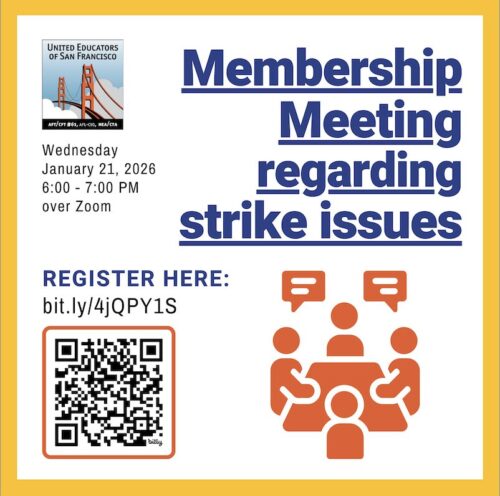
We will conduct a membership meeting at 6pm on Wednesday January 21st over Zoom to discuss strike issues for any member who has yet to engage at their worksites. Please note that the information presented at this meeting is the same as the information all site leaders/UBCs have been sharing, and is also accessible in Bargaining Team reports, archived UESF newsletters, and our website.
November 14 Bargaining Update
–
As we approach parent conference week, you once again prove that you are deeply committed to our students and families, and that is why you fight for the schools they deserve. This past week, thousands of you picketed to show your support for your big bargaining team and the demands that will continue to stabilize your schools. Everything we have done till now has been to prepare us for the time we are approaching. For the past eight months, we have worked hard to come to a negotiated settlement with the district. Despite our intentions, the district and the union remain far apart. Monday’s mediation session did not result in any agreements, and as a result, we will likely proceed to fact finding next.
Your picket power this week is important because it shows that you are serious and prepared across the entire district to win a fair contract. Pickets are an important practice in collective power, where you and your colleagues practice leading chants, taking attendance, and disseminating information from the bargaining team. These practices, paired with our communication structures, such as this video message in our Friday newsletter, are the foundation that will guide us through the coming period, during which we should expect misinformation about our bargaining demands. You must lean on these structures to maintain unity and to sustain the fight for the schools our students deserve.
In the headlines, some media outlets simply parrot the superintendent’s perspective that there is no money and that more cuts will stabilize the school district budget. The current superintendent, who is not an educator, is not the first superintendent to make this statement. Every year we have been in negotiations with the district, they have claimed the same thing. This is despite the facts you’ve seen with your own eyes: year after year, SFUSD closes its books with millions in surplus cash, year after year, they send out pink slips but start the next year with empty classrooms, year after year, they put families on a long waitlist to enroll their students in SFUSD while forcing under enrollment at schools.
With this most recent unaudited actuals, UESF observed that the District continues to mismanage its budget and does a very poor job of aligning costs with the needs of our schools. In the October budget presentation to the Board of Education, the District showed that the variance between its projected ending fund balance and its final fund balance was almost 70%. Normally, a best practice variance would range from 3-5%. It means that the District projected to have only $130 million in reserves in its unrestricted general fund and ended up with $220 million. This same behavior is repeated throughout the budget and has been the norm for the past several years. Your union is keenly aware of how poorly the District’s budget has been managed. Your union has pointed out year after year through our own analysis and reports that the District does not have position control and still struggles to know where people’s placements are, we know that they are over contracting special education services instead of prioritizing the hiring of our members and that they cannot offer quality control for the growing list of contracts offered to outside companies. Your union knows the budget better than they do, which is why we’re willing to negotiate when we get presented with actual figures.
Another talking point from the District is that they will have to close schools and make tough site budget decisions to balance their budget. You, your colleagues, and your union deeply understand the needs and opportunities at schools throughout this entire district. Your union has 120 UBCs, 100% coverage by union leaders at schools, and stays in regular contact. Management’s current approach is simply to react and then make excuses for their mismanagement, all while expecting you to remain silent and suffer the consequences.
The lack of seriousness with which the School Board and management approached the planned changes to the overly confusing and universally despised enrollment process, and their inability to plan out 2 to 3 years for programs that would welcome our San Francisco families, shows that all levels of the District leadership offer no actual vision for our public schools. Time and again, San Franciscans overwhelmingly supported public schools by passing propositions to invest more money, so our city deserves something better than simply making excuses for not paying folx, hiring adequate staffing, and making attractive programming for families.
In the coming months, you and your colleagues will organize the strongest actions UESF has taken in a generation. The power of thousands of UESF members – the educators, paraeducators, nurses, counselors, social workers, family liaisons, and more is needed to force this district to do its job. You and your coworkers have the power to educate and welcome families and fight for our students. As we approach the first strike vote on December 3 at Balboa High School, it is your power and that strike vote that will show the district we mean business. Good luck with your parent conferences because they always show overwhelmingly. They support their educators, and we will need them as we build up our actions.
________________________________________________________________________________________
November 12 Practice Pickets
_______________________________________________________________________
November 10 Bargaining Update
_______________________________________________________________________
November 12 Practice Pickets
After 8 months of bargaining, dozens of proposal exchanges, and an expired contract, District Management has left us no choice but to get strike ready. On Tuesday, October 14 you delivered over 4,000 strike ready signatures to the Board of Education. Our unity could be seen in the streets at 555 Franklin as our picket stretched around the entire block! District Management and the Board of Education must take seriously our clear commitment to strike for the schools our students deserve if the district makes it necessary.
Our next step is to hold practice pickets at every SFUSD school and worksite on Wednesday, November 12! We will picket for fully funded dependent health benefits, SpEd workload model, housing for our families, raises, and sanctuary schools!
We worked with a local artist to create these posters that you can hang up outside your classroom doors and work spaces. Officers and UESF Staff will be dropping the posters off to your UBC reps and we can’t wait to see them in our schools across the city!

_______________________________________________________________________
October 6 Bargaining Update
We ended the night by declaring an impasse. After 8 months of meetings, dozens of proposal exchanges, and an expired contract, the district is still unwilling to agree to our demands:
- Our SPED programs across the district should be set up to support our students and staff – We need a workload model now!
- All educators, both certified and classified, are due an increase in pay.
- The cost of healthcare should be covered for all dependents.
- Our schools are sanctuary schools, and our contract should reflect that.
- Our district should utilize its resources to ensure that our most vulnerable students have access to shelter.
Despite over 75% of UESF members proclaiming our readiness to strike, the District refuses to act with the urgency demanded in this moment. The district management’s refusal to move anywhere on our high priority demands, like benefits and workload, and low or no cost demands like protecting us from losing work to AI and contractors, has left us no choice but to move to impasse.
Last week, we announced that a supermajority of our members, over 4,000 of you, have signed the strike ready petition to say they are willing to strike if necessary! Join us on Tuesday, October 14, at 5 pm in front of 555 Franklin St. for a rally to support those signatures and deliver them directly to the Board of Education Meeting. RSVP Here!
_______________________________________________________________________
September 15 Bargaining Update
Our bargaining team met with District Management for our ninth bargaining session on September 15. Below is a summary of our session. You can also download our report out slide deck and view our bargaining update video on Instagram and YouTube.
The District presented a package proposal that would repurpose a 2% raise if we agreed to the elimination of AP preps, Paid Sabbatical Leaves, Department Head Preps and Stipends, and Class size limits. As a bargaining team, we unanimously rejected their package. This is effectively a zero percent raise. The District wants to pay for the 2% by increasing workloads and taking away benefits already in our contract.
We just launched our strike readiness petition, and already over 20 sites have met or exceeded their signature goal! There are 2 weeks left to connect with your UBC and get ready to take action. If the District makes it necessary, we will prepare to strike for the schools our students and educators deserve.
Mark your calendars for October 14, when UESF members will show our power by delivering our thousands of strike ready petition signatures at the Board of Education meeting. RSVP Here!
_______________________________________________________________________
August 18 Bargaining Update
Our bargaining team met with District Management for our eighth bargaining session on August 18. Below is a summary of our session. You can also download our report out slide deck and view our bargaining update video on Instagram or YouTube.
We hit the ground running this week, bargaining again for the first time since June. After they canceled our summer bargaining session, the District continues to offer a 0% raise for classified and certificated employees, and our only TA so far is around creating a new committee. We are now working with an expired contract, and it is all hands on deck!
Stay in touch with your UBC. On Saturday, August 23, leaders from all the Bay Area Educator Unions are coming together for the very first regional Strike Readiness Academy! At the Academy, we will meet to lay out our plans to win the schools our students deserve and launch a petition. Check in with your site leader to sign on to the Strike Ready Petition next week.
_______________________________________________________________________
June 9 Bargaining Update
Our bargaining team met with District Management for our seventh bargaining session on June 9. Below is a summary of our session. You can also download our report out slide deck and view our bargaining update video on Instagram or YouTube.
District Management continues to reject most of our proposals, claiming they want to “work with us” but offering zero language to do so. They continue to state they don’t believe certain things should be in the contract. They also introduced a brand new proposal, more than three months into bargaining, knowing that our current contract ends at the end of this month. We are nowhere close to agreeing on most proposals, let alone a new contract that would improve and stabilize our schools.
Over the Summer, we will continue to prepare to hit the ground running in August. There is no question that our organizing in the spring had an impact on avoiding so many layoffs, and we’ll need to bring that same energy into the fall to fight for the contract our students deserve!
_______________________________________________________________________
May 20 Bargaining Update
Our bargaining team met with District Management for our last in-person school year session on May 20! Below is a summary of our session and next steps. You can also download our report out slide deck and view our bargaining update video on Instagram or YouTube.
Unfortunately, the District did not come to the table ready to negotiate a deal to stabilize our schools in the Fall. They want to freeze all pay at current levels for 2 years, and did not come prepared with a response to all of our proposals.
We know that our power lies in the organizing that we’ve been doing with each other, our students, and our families all year at our school sites. Expanding that support is exactly what we need to come back in the Fall and win the schools our students deserve.
As we head into the summer, we will continue to meet with the District to negotiate small things, but we will not negotiate anything significant like our economic proposals or reach a tentative agreement when our membership is on break.
We will resume normal negotiations when we return to our school sites in the Fall. And can organize together to win a contract that we all deserve. We have proven that we are stronger at the negotiation table with our big bargaining team and at our school sites, where we have all spent the last few months organizing and picketing.
It might be a few weeks before we have another video update for you, but we’ll update you all when we have anything to report. We hope you have a wonderful summer, and we look forward to continuing to organize with you all for the schools our students deserve in the Fall.
_______________________________________________________________________
May 12 Bargaining Update
Our bargaining team met with District Management on May 12 for our fifth bargaining session! Below is a summary of our session and next steps. You can also download our report out slide deck and view our bargaining update video on Instagram or Youtube.
The District finally responded to our 20 proposals and made it clear they’re okay with the status quo. There’s no need to enshrine housing for homeless students, monitor overheated classrooms, consistently document violent incidents, or protect teachers who are injured on the job. They feel no urgency to ensure that destabilizing layoffs don’t happen when vacancies are in the hundreds. There is no need to address the crisis of special educator burnout or acknowledge the many needs of our students receiving special education services rather than use the outdated caseload model. They’d rather wait for the crisis to arrive than try to prepare ahead of time– a classic reactive rather than proactive stance.
📅 Key Dates:
🗣️ May 13: 6pm BOE Speak Out for Fully Staffed Schools
📢 May 17: Statewide Day of Action at 12pm, Embarcadero Plaza (RSVP HERE)
🗣️ May 20: Next Bargaining Session
After each bargaining session, you can expect a video update and slide deck to be shared, including links to all the proposals passed and the next steps. Your UBCs and work sites are more organized than ever, so check in with your site leaders for updates. Additionally, stay informed by following the UESF social media accounts on Instagram, Facebook, and Twitter and by checking back here for regular updates.
_______________________________________________________________________
April 24 Bargaining Update
Our bargaining team met with District Management on April 28 for our fourth bargaining session! Below is a summary of our session and PDFs of all proposals. You can also download our report out slide deck and view our bargaining update video on Instagram or Youtube.
We returned 1 counter proposal for Shelter & Housing, and the District passed 3 initial proposals and 1 counter proposal.
The District failed to Counter on our Highest Priorities:
- Workload model for Special Education
- Fully funded health benefits
- Improving pay for all educators
This leaves us with very little time to reach an agreement before our contract ends this summer! They offered cost estimates for our proposals, which matched our own– shout out to our research team for spot-on calculations. They also asked us to tell them our “real priorities” so they could start “narrowing their focus”!
UESF Counter Proposals
- In March, the District completely rejected our zero-cost proposal to protect the Stay Over Program to reduce student homelessness. In response, the bargaining team re-submitted our original proposal and brought in two community members to give testimony: a mother of two SFUSD students and the BVHM Community Schools Coordinator.
District Initial Proposals
1.Staff Meetings, AP Preps, and Stipends
- Removes the additional prep period granted to AP teachers
- Removes monthly time limits on site-based meetings
- Eliminates shared-decision making at the sites that was JUST won in 2023 and hasn’t been fully implemented!
- Ends the sabbatical program
- Removes duty-free prep for substitutes only assigned a single day
- Increases the required number of assignments per year from 10 to 36
- Eliminates the dedicated core substitute position
- Eliminates the classification of 40-day substitute
District Counter Proposals
The District agreed to:
- Advisory = zero prep
- Advisory Materials must be provided 2+ school days before
- 33% goal, 50% limit in co-taught classes
The District rejected:
- Weekly minute restriction on Advisory
- Restrictions on combo classes (elementary)
- Balancing co-taught classes if 33% goal not met
📅 Key Dates:
🌹 April 30: May Day Then & Now from 5–7 PM, Mission H.S. Library
📢 May 1: May Day Action at 4pm, Civic Center SF (RSVP HERE)
🗣️ May 12: Next Bargaining Session
📢 May 17: Statewide Day of Action at 12pm, Embarcadero Plaza (RSVP HERE)
After each bargaining session, you can expect a video update and slide deck to be shared, including links to all the proposals passed and the next steps. Your UBCs and work sites are more organized than ever, so check in with your site leaders for updates. Additionally, stay informed by following the UESF social media accounts on Instagram, Facebook, and Twitter and by checking back here for regular updates.
_______________________________________________________________________
April 14Bargaining Update
Our bargaining team met with the District on April 14 for our third bargaining session! Below is a summary of our session and PDFs of all six proposals. You can also download our report out slide deck and view our bargaining update video on Instagram and youtube.
SFUSD’s representatives did not offer any proposals of their own, nor did they offer any additional response on the 20 proposals that seek to stabilize our schools, improve educator pay, fully staff schools, and address dignified learning and working conditions.
Our five proposals focused and services for our students, paraeducator and T10 workdays; demanding an end to unsupported advisories and combination classes; clarification of classifications for Head counselors, Deans, and School Counselors; And a solution for the unmanageable caseloads and class sizes that are driving people from our district.
- Respect Paraeducators: 35 (or 40) hr work week & Planning Time
- Aligns paraeducator workday with Certificated workday.
- Provides planning time for classroom paraeducators.
- Offers T10 Security Aids the ability to work 8 hour days (including breaks).
- Counselor Workload
- Ensures there is at least 1 head counselor, 1 dean, and 1 school counselor at each secondary site (including K-8)
- Clarifies the roles of head counselor vs dean
- Provides extra counselors, beyond proposed caseloads, for schools with high focal populations (i.e. newcomer students, foster youth, etc)
- Class Sizes & Caseload Limits
- Strengthens contract language from class size goals to class size limits.
- Reduces case load numbers for most service providers, including counselors reducing their caseload to 1:200
- Provides compensation of $1,000 per student, per semester for unit members if class sizes or caseloads go over the limits (up to two students over)
- Fully Staffing School – Equitable Staffing Model
- Creates an equitable school staffing model that ensures:
- 1 full time social worker at all schools
- .5 or full time nurse at all elementary schools
- 1 full time nurse at all secondary schools
- 2 centrally funded positions for student & family services
- funding allocations for schools with high focal student populations
- a report for the Union every January around their plan to meet this staffing model
- Creates an equitable school staffing model that ensures:
- Honoring Student Time
- Ensures that the number of students with IEPs in a co-taught class shall not exceed 50%, with the goal being 33%
- Limits grades 4/5 combo classes size to 28 students
- Eliminates combo classes in grades K-3
- States that advisory cannot require teacher prep and is not considered additional class
In our last negotiations session 3 weeks ago, UESF passed our highest priorities: a workload model, fully paid health benefits for those with dependents, and a raise for all educators. District management was unable to respond despite having three work weeks between sessions. This was an insult to the time and effort of our bargaining team as well as the families and students we serve. We are living through instability caused by decades of mismanagement.
From April 21-25, at 83 sites across the district, join fellow educators for informational pickets to make our voices heard and connect with our students and families! The pickets are our chance to make sure they understand our commitment to winning our priorities and demanding stability for our schools! Alone, we can do so little; together, we can do so much. RSVP for the pickets here.
After each bargaining session, you can expect a video update and slide deck to be shared, including links to all the proposals passed and the next steps. Your UBCs and work sites are more organized than ever, so check in with your site leaders for updates. Additionally, stay informed by following the UESF social media accounts on Instagram, Facebook, and Twitter and by checking back here for regular updates.
_______________________________________________________________________
March 24 Bargaining Update
Our 125 member team met with the District on March 24 for our second bargaining session! Below is a summary of our session and PDFs of all six proposals. You can also download our report out slide deck and view our bargaining update video on Instagram.
During our session, we passed 6 proposals to the district, including our highest priorities: improved educator pay, employer funded healthcare for members and dependants, and a SPED workload model. In addition to these economic proposals we also presented proposals on San Francisco sanctuary city status, protections from artificial intelligence and standardized hours for paraeducators. The district rejected our proposals for shelter and housing for our students and families and almost entirely threw out our request for protections against privatization.
March 24 UESF Proposal PDFs
1. Employer-Funded Health Benefits
- Provides all members with dependents with fully paid coverage on Kaiser health plan
- Ensures any member who elects a non-Kaiser plan will only contribute the difference between the Kaiser plan and their choice (for both themselves and dependents)
- Increase classified pay by 14% over 2 years,
- 7% year 1 and 7% year 2
- Increases floating holidays from 6 to 10
- Increases pay differential for bilingual classified staff and for some SpEd paras
- Adds a Career Increment C & clarifies 3 years at each increment
- Increase certificated pay by 9% over 2 years
- 4.5% year 1 and 4.5% year 2
- Add an additional schedule for BA +75
- Transforms how we measure the appropriate amount of work for many service providers (note: SLPs already have a workload model in place)
- Shifts from caseload model to workload model
- It creates a points system that takes into account SAI minutes, initials/triennials, ERMHS, Behavior Intervention Plans, Intensive Individual Services, and case management
- Caseload limits will be based on the amount of work required not just the number of students
- In practice, this will lower caseloads for educators with particularly time-intensive students and increase the likelihood that they can actually provide services adequately
4. Standardized Work Hours for Paraeducators
- Establishes FTE status for paraeducators
- Ensures paraeducators qualify for stipends, benefits, and other contractual provisions tied to FTE status
5. Sanctuary Schools, Sanctuary Employer
- Requires adherence by District to Sanctuary City policies and mandates the availabilitiy of training on said policies for all unit members
- Requires the District to maintain an emergency management website with info on ICE activity
- Provides protections, legal support, and release days for unit members dealing with immigration and/or work authorization issues
6. Protections from Effects of AI
- Ensures the district will not replace UESF members or our work with AI
- Ensures there is oversight, warning, training for unit members, and analysis of any AI systems that are put into place
- Prevents from the district using AI to monitor, evaluate, or collect data on the bargaining unit member.
We have three big dates coming up so be sure to mark your calendars!
🎨 April 12: Art Build w/ artist David Solnit @ Vis Valley MS Art Build RSVP
🗣️ April 14: Next bargaining session
📢 April 21-25: City-wide week of school site pickets
The most important dates of them all are April 21-25 our city wide week of pickets happening! A huge turnout to our site pickets is going to be key to winning big for our students, educators and schools.
After each bargaining session, you can expect a video update and slide deck to be shared, including links to all the proposals passed and the next steps. Your UBCs and work sites are more organized than ever, so check in with your site leaders for updates. Additionally, stay informed by following the UESF social media accounts on Instagram, Facebook, and Twitter and by checking back here for regular updates.
_______________________________________________________________________
March 10 Bargaining Update
Our big bargaining team has grown and we are 125 members strong from 80 different schools and worksites! During our session on March 10, we passed nine UESF proposals across the table. As this was our first meeting, we introduced a lot of proposals so that we could get as much done as soon and as smoothly as possible.
We have created many ways to keep members informed after each bargaining session! Below is a summary of our first session and PDFs of all nine proposals. You can also download our report out slide deck and view our bargaining update video on Instagram.
March 10 UESF Proposal PDFs
1. Paraeducator Pension and Retirement
- Creates a research committee to analyze potential pension/retirement plans for classified staff
2. EED/Part-Time School Age Teachers: PD Days and Break Pay
- Provides parity for part-time school age teachers with their full-time counterparts in terms of benefits, PD days, and paid time off
3. Impacts of Financial Instability
- Requires District to complete a community impact report before layoffs
- Requires District to refrain from layoffs when vacancies exist
- Establishes rules to deal with educator assignment and reassignment in the case of school closures/mergers.
4. Shelter and Housing for Students and Families
- Formalizes and expands the Stay Over Program (started at BVHM) to provide emergency housing and support SFUSD families with access to critical services
- Note: this is what’s called a “Common good proposal” — something we choose to bargain for the good of our students, families, educators, and school communities.
5. Safety: Intervention Tracking System
- Proposes a uniform incident report system implemented District-wide to track interventions and supports
- Said system provides all unit members access to pertinent information such as BIPs, safety plans, and past referrals.
- Formalizes the right of educators to remove themselves from the school environment following an attack, assault, or injury.
- Allows UESF members’ children to receive priority school assignment at member’s work site.
- Guarantees approval of all inter-district transfer applications for members’ children
7. Protections from Privatization/Contracting Out
- Introduces guardrails and restrictions to the District contracting out positions that could be filled by unit members
- Requires that contractors are used only in emergencies and are held to the same duties as unit members.
- Ensures all unit member positions are publicly posted to allow for hiring to occur before contracting out
8. Teacher Librarian Working Conditions
- Protects transition time, adequate break time, and max of 6 classes/day
- Formalizes a process for reassignment with more protections for teacher librarians to reduce random reassignments
- Proposes minimum standards for facilities, including an acceptable temperature range of 65 – 75 F.
- Requires District to provide schools with tools to monitor air quality, temperature, mold, etc.
- Requires age-appropriate facilities for TK / pre-K spaces.
Everything that was presented at our first bargaining session is either low cost or no cost. While these proposals won’t fix decades of fiscal mismanagement, these nine proposals could go a long way toward stabilizing schools for staff, students, communities, and admistration. We have developed over 20 proposals we will pass in the coming weeks that all seek to improve working and learning conditions as we fight for stable and fully staffed schools. After each session we will share out links to the pdfs to each proposal.
As members who engage with San Francisco’s students daily, we know what’s needed to rebuild our schools after decades of divestment. We understand that the educators on the ground are often the only stabilizing force in a district in disarray. It’s challenging to do our jobs with the specter of closing schools and layoffs hanging over our heads! Our students, their families, and our staff deserve stable and well-staffed environments in which to learn and teach.
Our next bargaining session is set for March 24. Be sure to wear your union shirt to school that day to show your support for the bargaining team! After each bargaining session, you can expect a video update and slide deck to be shared, including links to all the proposals passed and the next steps. Your UBCs and work sites are more organized than ever, so check in with your site leaders for updates. Additionally, stay informed by following the UESF social media accounts on Instagram, Facebook, and Twitter and by checking back here for regular updates.


